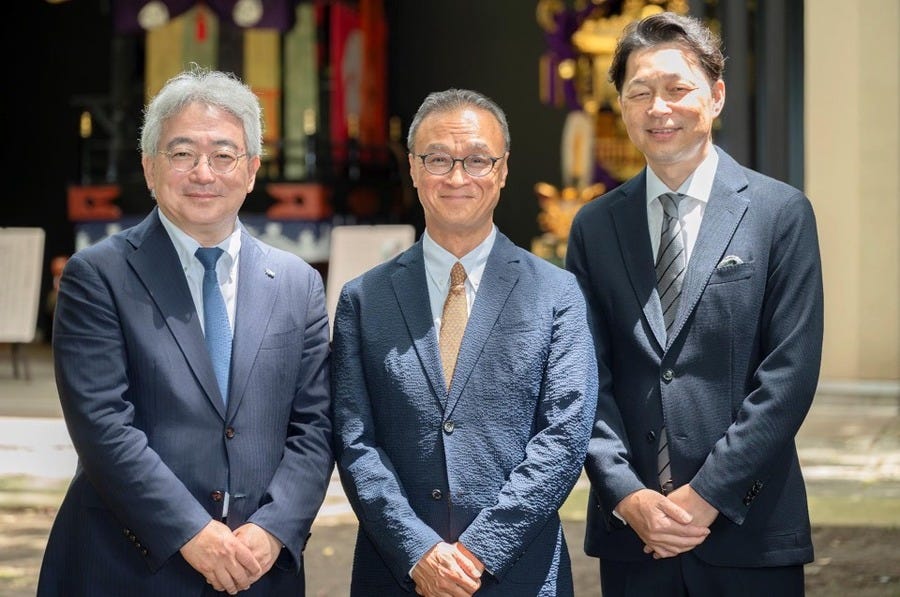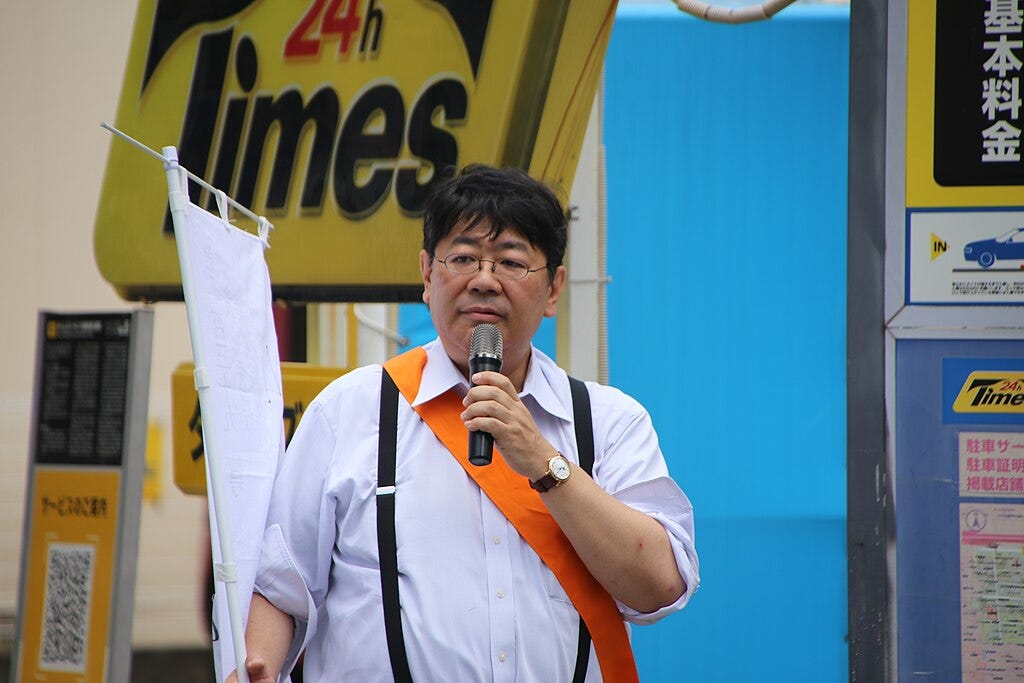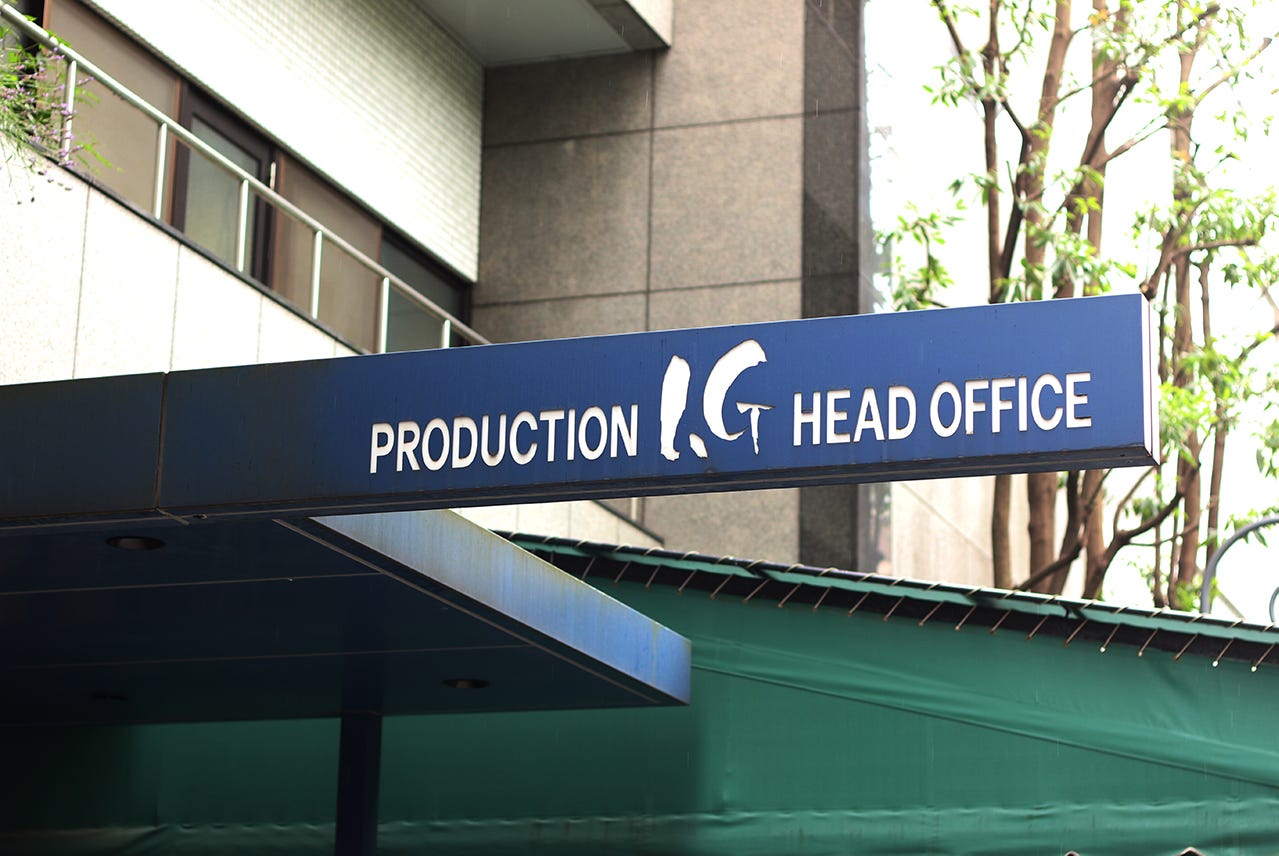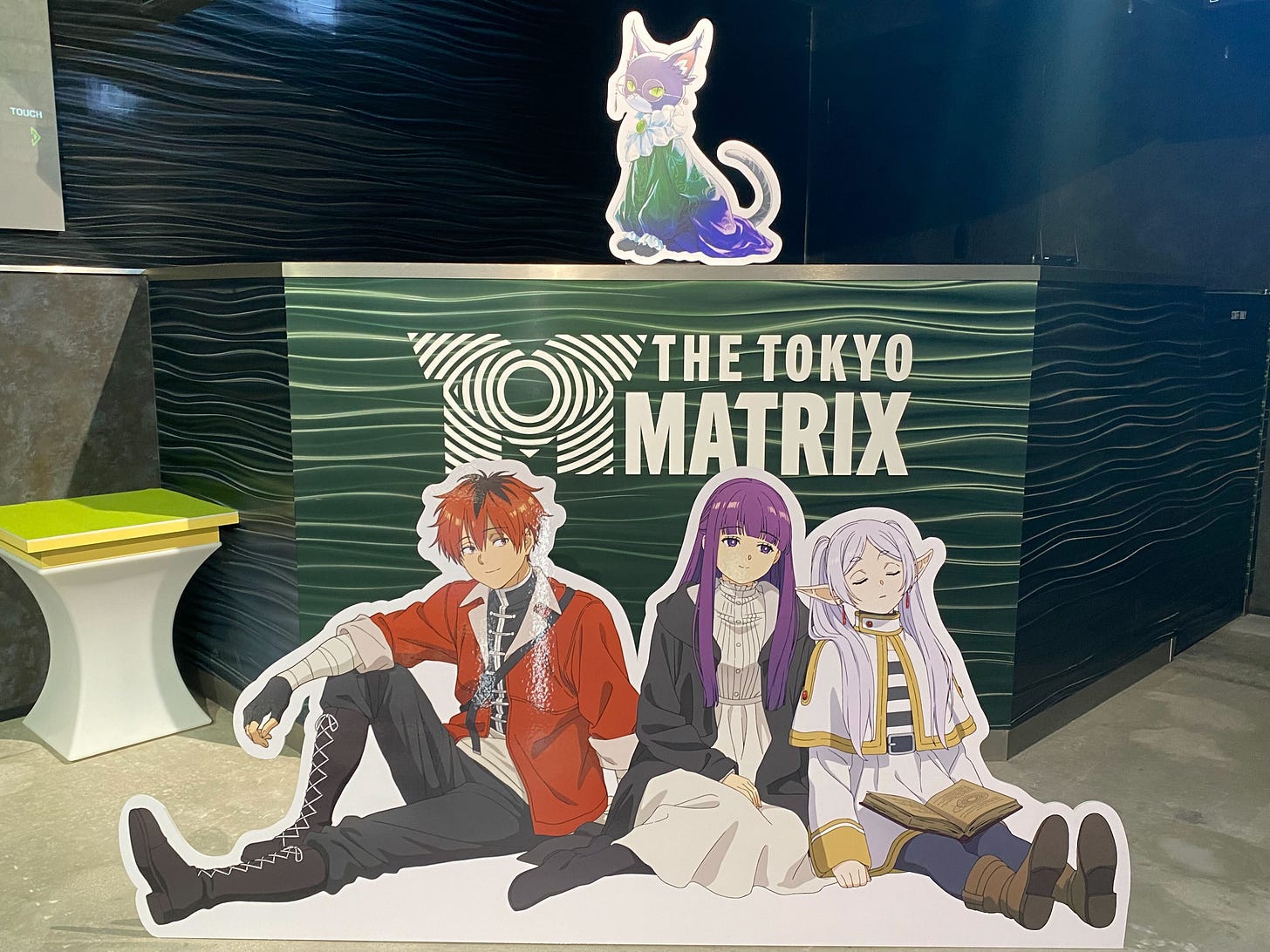TBS taps veteran anime exec for new IP unit
Plus: Sony adds anime collabs to immersive attraction; Anime industry ally reelected to Japan upper house; Hideaki Anno joins Production I.G board; and more
This is your weekly Animenomics briefing, covering the business of anime and manga. Today is Wednesday, July 23, 2025.
In case you missed it: The first installment of the Demon Slayer: Infinity Castle anime film trilogy earned ¥5.52 billion (US$37.4 million) in box office ticket sales in Japan in its first three days of release—19 percent more than the three-day earnings of Demon Slayer: Mugen Train, the highest-grossing Japanese film of all time, in 2020.
Zoom in: Infinity Castle’s first chapter also broke Japan’s opening day film ticket sales record on Friday and the all-time single day ticket sales record on Sunday, according to box office ticket sales data provider Kogyo Tsushinsha.
Go deeper: I recently spoke with Matt Schley at Screen and gave my predictions as Infinity Castle prepares for international release starting in August.
Former TV Tokyo anime chief to lead TBS IP subsidiary

Japanese broadcasting group TBS Holdings has tapped former TV Tokyo anime chief Yukio Kawasaki to lead its new anime and IP production business SAND B—short for sandbox—starting in August.
Why it matters: Kawasaki’s appointment signals a commitment to IP development from TBS, which has lagged behind peers like Nippon TV and TV Tokyo in finding new revenue sources outside of broadcast advertising.
Catch up quick: Kawasaki was instrumental in building TV Tokyo’s anime business by licensing out titles like Yu-Gi-Oh!, Naruto, and Bleach that are now iconic.
He brokered a deal with Crunchyroll that allowed the streaming service to host episodes of Naruto: Shippuden in 2009, helping the platform shift from serving pirated anime to licensed content.
Following the deal, TV Tokyo named Kawasaki the head of its burgeoning anime business, a position he would remain in until recently as the general manager of the anime, IP, and event business division.
Between the lines: Kawasaki’s seismic move to TBS after nearly 40 years at TV Tokyo occurred despite the broadcaster’s holding company designating anime as its “first growth engine”.
Kawasaki could have been a candidate to become chief executive of the holding company, but that position is historically reserved for former employees of Nikkei, TV Tokyo’s largest shareholder.
Where things stand: As previously reported by Animenomics, TBS will invest as much as ¥30 billion (US$205 million) in SAND B for the purpose of “maximizing IP revenue”.
TBS acquired anime studio Seven Arcs in 2019, but that business has continued to post a net loss as recently as 2022.
“What is required of the new company is not simply the planning and production of anime and other works, but rather creating something that will become the core of the group’s entertainment business,” anime industry expert Tadashi Sudo wrote in May.
What’s next: Executives from Mainichi Broadcasting System will also work with SAND B in a partnership centered on anime production and merchandising.
MBS has a successful track record of developing anime titles like Fullmetal Alchemist: Brotherhood and Mobile Suit Gundam Seed.
Sony adds location-based entertainment anime collabs
Sony Music Solutions is adding anime tie-ins to its Dungeon ∞ Spiral immersive in-person attraction in Tokyo, tapping into internal and external IPs in an effort to grow a customer base for location-based entertainment.
Why it matters: Sony believes play-oriented immersive experiences can help grow the potential of entertainment brands in its portfolio.
“Aspirational, cross-business collaborative efforts that merge IP and technology to create new experiences have all illustrated the growth protentional for future,” chief executive officer Hiroki Totoki said in a strategy presentation in May.
What’s happening: A collaboration launched last week with Frieren: Beyond Journey’s End is Dungeon ∞ Spiral’s first partnership with a non-Sony property.
Dungeon ∞ Spiral’s previous collaboration with Lycoris Recoil, an anime property under Sony’s Aniplex unit, helped increase visitor numbers to the attraction, says venue operator The Tokyo Matrix.
“We chose Frieren: Beyond Journey’s End to collaborate with because we believe it is one of the most fitting works for an attraction based on dungeon adventures,” The Tokyo Matrix chief producer Tsuneyuki Matsudaira tells Animenomics.
Zoom in: While Dungeon ∞ Spiral seeks to collaborate with more external anime IPs, Matsudaira admits working with a Sony property can speed up the planning process.
“Of course, working with IPs within the Sony Group makes internal discussions easier, but Dungeon ∞ Spiral is not limited to Sony-owned properties,” he says.
What we’re watching: Whether collaborating with internationally popular anime IPs will draw some of the growing ranks of foreign tourists.
“Since this collaboration event is being held in Japan, we’re not necessarily aiming for direct international visitor traffic,” Matsudaira explains. “That said, we’d be delighted if foreign guests who happen to visit naturally recognize ‘Oh, it’s Frieren!’ and enjoy the experience.”
Clippings: Anime industry ally wins reelection in Japan

Anime industry ally Taro Yamada won reelection to a six-year term in Japan’s House of Councillors on Sunday, retaining one of 50 proportional representation seats in the upper legislative chamber for the ruling Liberal Democratic Party. (NHK News)
Why it matters: Yamada, and manga artist and fellow legislator Ken Akamatsu, advocate for anime and manga creators and oppose restrictions on freedom of expression that could hinder Japan’s anime, manga, and video games industries.
Publishing giant HarperCollins is buying Crunchyroll’s manga publishing operations in France and Germany, originally VIZ Media Europe prior to its sale to Crunchyroll at the end of 2019. (Publishing Perspectives)
Some context: As previously reported by Animenomics, Crunchyroll is preparing to launch a digital manga platform as part of last year’s ¥50 billion investment by Sony in light novel and manga publisher Kadokawa.
Seattle-based Fantagraphics was forced to move printing of the English-language edition of Atsushi Kaneko’s manga Search and Destroy outside China last year due to issues flagged by the country’s publishing regulator. (Publishers Weekly)
Animax Broadcast Japan is investing in manga publisher Earth Star Entertainment’s parent Culture Entertainment Group in order to further develop the Utahime Dream media mix IP for use by the satellite anime broadcaster. (Nikkei Marketing Journal)
Printing conglomerate Toppan will enter the anime merchandise wholesale business in the United Kingdom through local subsidiary Cross Media that it acquired last year and aims for ¥3 billion (US$20.5 million) in sales by 2030. (The Nikkei)
The Cool Japan Fund, the Japan ICT Fund, and Japan International Broadcasting have divested from efforts to grow Japanese television dramas and anime in Myanmar due to political developments under the country’s military rule. (The Sankei Shimbun)
Shanghai-based Papergames fueled a 124 percent year-on-year growth in China’s female-oriented games market last year thanks to the popularity of its science fiction romance mobile game Love and Deepspace. (Nikkei Asia)
‘Evangelion’ creator Anno to join Production I.G board

Neon Genesis Evangelion creator and anime studio Khara founder Hideaki Anno will join Production I.G’s board of directors in August, a high-profile appointment that highlights the interconnected nature of the anime production business.
Why it matters: It’s rare for an active corporate officer to receive an appointment to the board of directors of another company in the same industry.
However, such appointments are usually acceptable in the anime industry due to a long history of studios exchanging personnel.
Rewind: Anno’s appointment isn’t the first instance of an anime studio adding another studio’s executive to its board this year.
In April, MAPPA added to its board of directors Yuichi Fukushima, an executive vice president at CloverWorks and the president of JOEN, both Aniplex anime production subsidiaries.
“The industry is built on acts of goodwill such as helping each other in times of trouble and always repaying favors received,” anime industry journalist Atsushi Matsumoto writes in a column.
The bigger picture: Matsumoto believes Anno and Production I.G board chairman Mitsuhisa Ishikawa, both of whom entered the anime industry during its transition to the production committee system and are now in their 60s, will help guide the next generation of business leaders at the studio and its group companies.
Production I.G parent IG Port reported in its year-end earnings presentation this month that the company continues to face the pressure of rising costs in anime production even as expectations for IP revenue increase.
“By being involved in the management of the group […] they will be confronted with the current situation, which has been called the IP bubble due to the rapid expansion of the market overseas through streaming, and will be searching for an optimal solution for the organization,” Matsumoto writes.
Animenomics is an independently run and reader-supported publication. If you enjoyed this newsletter, consider sharing it with others.



